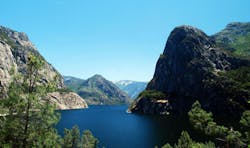Building a resilient water future in San Francisco
TORONTO, JULY 27, 2017 -- The need for collaboration to combat climate change is more crucial than ever before, and the water industry is grouping together to build a resilient response.
Delivering water 24 hours a day, seven days a week without interruption is a basic necessity for public health. This constant supply is a top priority for San Francisco Public Utilities Commission (SFPUC). SFPUC is building upon its centralized water infrastructure by integrating smaller, onsite water treatment systems that help stretch drinking water supplies
"Diversifying our water supplies is one of the most important steps we can take to plan for risks today and make our water supply more reliable for tomorrow. We are implementing several programs, including conservation, groundwater, recycled water, and non-potable programs, to diversify our water supply portfolio," said Paula Kehoe, Director of Water Services, SFPUC in an interview published by World Water Tech - North America.
SFPUC delivers water to 2.7 million customers including residents and businesses in San Francisco. It relies on several reservoirs: 85% of the supply is sourced from the Hetch Hetchy Reservoir in Yosemite National Park, and the other 15% comes from five local reservoirs in the San Francisco Bay Area.
Through a "One Water" approach, all water -- drinking water, wastewater, stormwater, graywater, and more -- can be managed as resources that utilize all stages of the water cycle according to SFPUC.
"We recognize an opportunity exists to build upon our centralized water infrastructure by integrating smaller, onsite water treatment systems to produce water fit for toilet flushing and irrigation that not only matches the right resource to the right use, but also helps us stretch our drinking water supplies," said Kehoe.
And as San Francisco Public Utilities Commission looks to diversify its water supply portfolio, the optimization of finite water and energy resources is one of their main focuses right now.
"Our mission has recently evolved with OneWaterSF. We are committed to a new approach to water and energy resource management," said Kehoe. "We are moving away from operating within traditional water, wastewater, and energy boundaries to developing projects and programs that consider the impact of one resource on another and taking a holistic view to optimize resources and maximize benefits across the organization."
Innovation is happening all over the world and utilities across the U.S. are implementing strategies to produce resources from wastewater, biosolids and biogas. As well as this, the water industry is keen to adopt new technologies for a sustainable future, but Kehoe admits there's areas that still need improvement.
"We are most interested in resource recovery technologies to generate drinking water, non-potable water, fertilizer and energy that can be optimized at various scales. With these new types of technologies becoming cost-effective, we can transform the water sector with resource recovery facilities of various sizes and scales not only in San Francisco, but throughout the world."
Paula Kehoe is speaking on the panel Building Resilience in Response to Crisis and Extreme Events at World Water-Tech North America in Toronto on November 2-3, 2017, part of Ontario Water Innovation Week. Paula will be joined by leading utilities including Ben Stanford of American Water and Ted Henifin of Hampton Roads Sanitation District where they will provide crucial insight into strategies for mitigating climate risk, while investigating innovations to reduce severity, disruption and cost of weather extremes.
